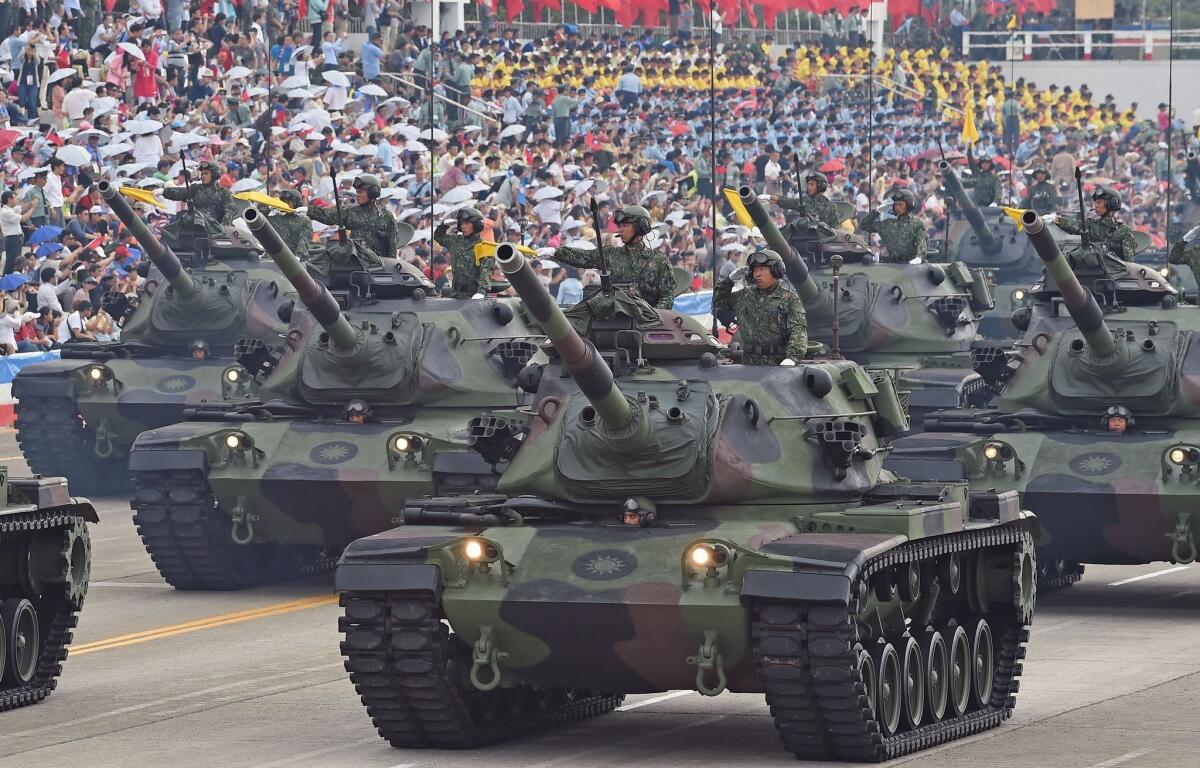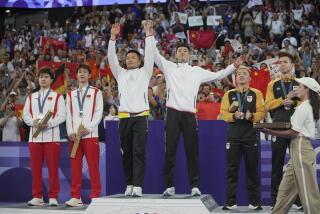At WWII victory parade, Taiwan’s Nationalists tout role fighting Japan

Soldiers salute from M60A3 tanks during a parade in Taiwan marking 70 years since the end of World War II at a military base in Hsinchu, northern Taiwan, on July 4.
- Share via
Reporting from Taipei, Taiwan — Taiwan jabbed at mainland China this weekend with a two-hour military show aimed at asserting credit for defeating Japan in a key World War II theater, but Beijing is expected to absorb the barb as it seeks friendly relations with the island -- even though it credits its own Communist forces for the same victory.
This year marks the 70th anniversary of the end of World War II, and nations across Asia are marking the event in a variety of ways. Mainland China is planning a massive military parade in early September to commemorate the event, but Taiwan has said it would not send any participants to those events.
Taiwan staged V-shaped military aircraft flyovers and a first-ever display of homegrown missile systems at its headline anniversary event Saturday at a military base in the north of the island. Taiwan has upgraded weaponry in recent years mainly to brace against any conflict with mainland China.
During Japan’s 1931-45 occupation of China, the Nationalist Party headed by Chiang Kai-shek resisted the Japanese and ruled most of the inland areas that did not fall to them. The Chinese Communist Party engaged in separate guerrilla warfare against the Japanese.
The Nationalist Party was forced to retreat to Taiwan after losing China’s civil war to Mao Tse-tung’s Communists in the late 1940s.
Since then, Taiwan and mainland China have been separately ruled, though Taiwan has never formally declared independence and Beijing continues to claim sovereignty over the island, straining relations for decades. Taiwan is formally known as the Republic of China.
“The Chinese Communists will say they were the major force resisting Japan, but that’s just a way of cheating public opinion,” Taiwan Defense Ministry spokesman Lo Shao-he said. “Over eight years of resistance, it was our Republic of China forces who led it.”
In a speech after the Saturday show, Taiwanese President Ma Ying-jeou said fighting by Republic of China forces in World War II would not be forgotten, nor can the Republic of China’s “victory” in the war be “distorted.”
Republic of China troops at times had to use simple knives against the militarily superior Japanese, recalled Tao Shih-chun, a 97-year-old veteran at the military show. At least 10 million Chinese people died during the resistance, with some estimates far higher.
Japan formally surrendered in September 1945 after intensive American airstrikes including the dropping of atomic bombs on Hiroshima and Nagasaki.
The Taiwan government’s assertion of wartime leadership follows years of efforts to avoid being eclipsed internationally by the much larger mainland China as officials in Beijing try to diminish the island’s global profile.
“It is of course a concern for the leadership here,” said Raymond Wu, managing director of political risk consultancy e-telligence in Taipei. “It goes back to the old angle between China and Taiwan about legitimacy.”
After years of all but ignoring the Nationalists’ contributions to wartime fighting, Beijing has begun to acknowledge their efforts -- but still maintains that Communist forces’ contributions were decisive.
Mainland scholars now speak openly about the Republic of China’s clout in World War II, said Kweibo Huang, associate diplomacy professor at National Chengchi University in Taipei.
At Saturday’s military hardware parade, Taiwan brought out modern surface-to-air missiles and attack helicopters, some flying at steep angles above a crowd of thousands at a mountainous military base.
China is not expected to publicly challenge the narrative Taiwan put on display Saturday. Since Ma, of the Nationalist Party, was elected in 2008, the two sides have set aside political disputes to pursue dialogue after decades of icy relations.
Beijing prefers a Nationalist Party-led government in Taiwan, rather than one led by the island’s chief opposition party, which advocates more distance from China. The island will hold elections next year, and Ma cannot seek office again. Early opinion polls show the opposition party with the lead.
“China should be happy because the military parade will stimulate everyone’s understanding of the Republic of China, and it’s not for the promotion of a separate Taiwan identity,” Huang said.
Jennings is a special correspondent
More to Read
Sign up for Essential California
The most important California stories and recommendations in your inbox every morning.
You may occasionally receive promotional content from the Los Angeles Times.












